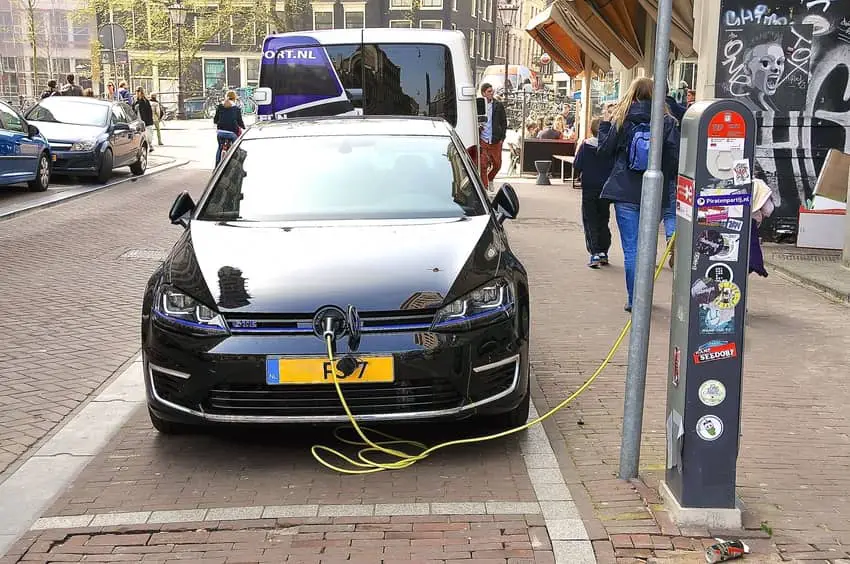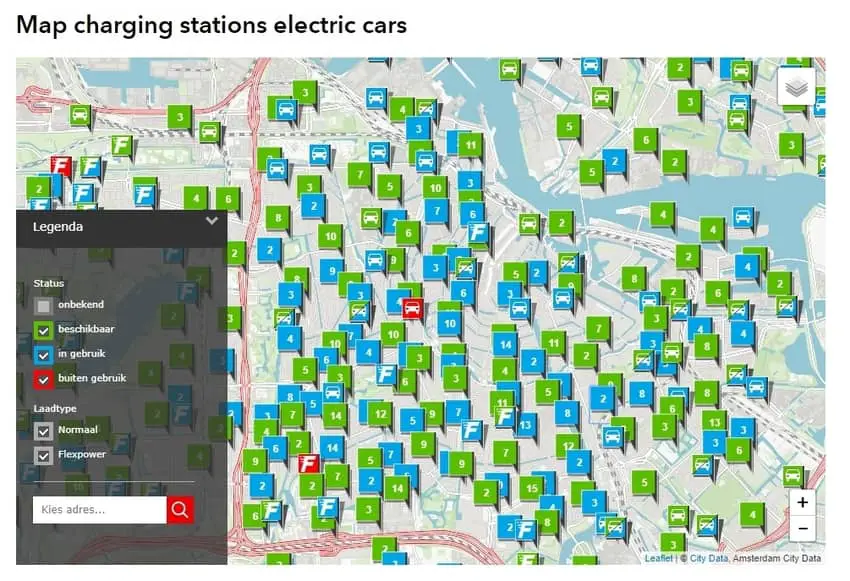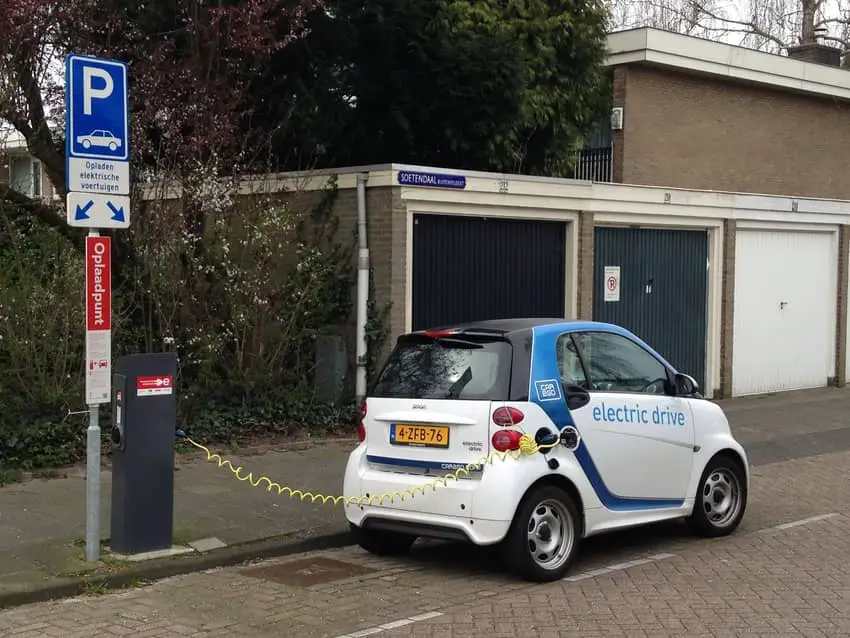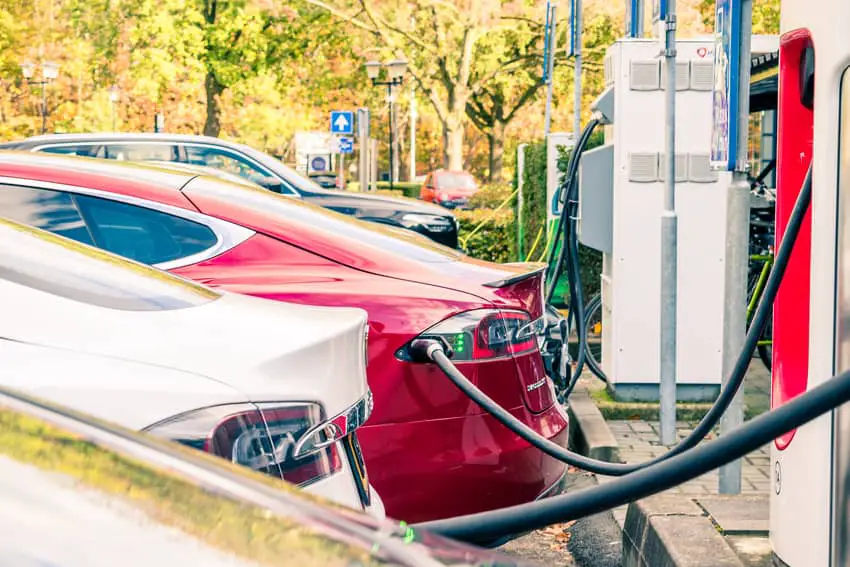Nowadays Electric Cars have gained their way in the car market as one of the favourite ones for urban trips, small cities and many European capitals. The Netherlands is no exception and in many of its cities, like Amsterdam, you, as an electric car owner will find many facilities anywhere you go.
In order to charge an electric car at a public charging point, you need a pass. You can ask for it online or you can also use your personal charging card. There is no time limit on charging at the charging point and there are many charging companies in the Netherlands. Expect to pay at least 30 cent per kWh.

In bigger cities like Amsterdam, you will be able to view the electric vehicle charging points on a map. These spaces are only available for electric cars and these have priority on the parking permit waiting list.
Charging your Electric Car
In the past few years, the number of electric cars in the Netherlands has been growing and the projections for the upcoming years are very bright. This means that the whole country is very well-prepared for electric cars, including charging them, prices, stations and so on.
If you want to know more about this, here there are some of the basic questions answered for you:
Where can I charge my electric car?
Since electric cars have started to be popular in the Netherlands, the number of electric charging spots have grown. Different electric companies work with the Netherlands. Some cities, like Amsterdam, have also an agreement with the City Hall to charge your electric company membership card. For instance, there is a list of companies that work in the Netherlands and you can use those membership cards to charge yours in the Netherlands.

Here there is a list of all the electric car charger companies that work in the Netherlands. There is information about each charging spot, the electricity level, charging time and type of connector. These are the listed companies:
- Alfen: locations
- Allego BV: locations
- Blue Corner (Belgium): locations
- Chargepoint (COULOMB TECHNOLOGIES): locations
- Ecotap: locations
- E-Laad: locations
- Enovates: locations
- Essent (NL): locations
- EV-Box: locations
- EVNETNL: locations
- EV-Point: locations
- FastNed: locations
- Flow Charging: locations
- Greenflux: locations
- Incharge: locations
- Ionity: locations
- Lidl: locations
- MisterGreen: locations
- NomadPower: locations
- Nuon: locations
- Park and Charge: locations
- RWE Mobility/Essent: locations
- Tesla Motors: locations
- The New Motion: locations
- And more here.
Each city has many charging points, some of them also belong to the city. For instance, in the city of AMSTERDAM has its own charging points. The City Hall of Amsterdam recommends Amsterdam citizens (and visitors or locals with cars from Germany, Belgium, France and Sweden) to get a membership card to activate the charging spot. It works this way:
- You can ask for the card here.
- Your first charge is free
- Every time you use it, it costs 10 euros.
- Private cards are also valid.
- Here there is a map for charging stations, green for free, blue for busy and red for private.
- If you live there you can ask for a free station
- You must have a valid parking permit or pay for on-street parking.
- There are private parking loads with charging stations: info.
- Charging power changes during the day, being stronger at night and less during the day.
How can I charge the car?
Charging poles in the Netherlands are heavily subsidized by local governments, they are of high quality and there are many of them all along with the country.

- First of all you have to find a designated spot for electric vehicles, for cars or motorcycles. You have a helpful list right in the question above this one.
- When you are parked there, your car has to be connected to the charging point at all times. There is no time limit on charging at the charging point.
- Once you are there you need to have a personal charging card in order to connect. These can be of other companies or you can request one at Nuon-Vattenfall (in Dutch) for the Netherlands.
- After you have settled your car, you need to make sure you have paid the parking rate of the place you are at if that happens to be on the street.
Visitors and locals can also pay for vehicle charging via an app (Apple or Android). Or search for the app Incharge by Vattenfall AB. This is only for those requesting the Nuon-Vattenfall card for cities like Amsterdam. In other cases, your personal card on the designated spot of your card company should work perfectly fine.
When in Amsterdam, if you park in a private parking load, you can also charge your electric car. These are the charging points for electric vehicles at all P+R locations in Amsterdam.
The Dutch infrastructure for the supply of electric energy is of high quality and superior performance. You are going to be paying a lot but for a good-quality, high-speed charging spot. The infrastructure for charging electric vehicles (EV’s) is well organized. Private and public parties have created an open and competitive market model for the development of the EV charging infrastructure. This has been like this since the year 2011.
How much it costs to charge my electric car?
When wondering about how to charge an electric car, one of the most common questions that gets to anyone’s mind is what one kilo-Watt-hour (kWh) would cost. Same as gas changes depending on the country but also depending on the gas station you choose, electricity depends also on the same factors.
The average electricity fee is about €0.22 – €0.23 per kWh in The Netherlands. If you compare this price to the regular private electricity prices at home, it ends up feeling expensive. This is because of the high-quality and high-speed charging stations you will find in this country. Dutch electric charging companies invest a lot in quality, which ends up making using your electric car much easier, better, efficient and a great option in the end. However, in some charging pole the price is around 30 cent per kWh, though the real costs are closer to EUR 1 (calculation based on publications by Stichting E-Laad)
You have the option of charging along the highway, which means that you don’t have to leave the road and will waste less time. However, these A-locations along the highway are even more expensive to operate. It depends on what station you are at.
If you consider a home structure you need to consider the additional investments in a home charger and possibly a heavier grid connection. This can easily mean a couple more thousand euros per year as an investment.
If you are traveling in the Netherlands, you want the speed of charging to be fast, something especially important. You want to continue your journey as quick as possible, so the faster the better: when you look for your charging spot online, you will see that there will inform you of the charging speed, availability and so on. In the Netherlands, Tesla charging stations have a 3 level power of charging, one of the highest in the whole country.

The speed of charging and the cost of the charging station depends on the model of your car. If you need a charging station in the Netherland for private use, you can ask for a quote here. You can also contact the City Hall of your city because these charging stations are also subsidised by the Government.
Do I have to pay for the parking space on a charging station?
Parking your car in the center of any Dutch city is quite expensive. You can find charging stations in the city centers and also at big parking load spaces. This means that in both cases you will have to pay the exact rate any other car has to pay to be parked there for the number of hours you will be there. However, if it is your private residence you will only have to request a permit at your city hall and you will only have to pay once a year to be able to park close to home on a daily basis.
Electric Cars in the Netherlands
The Dutch Government is strongly in favour of any environmentally friendly choice, including the purchase and use of electric vehicles. Because of this, they have made all sorts of arrangements to make more attractive to Dutch citizens to purchase them and reduce the CO2 in a country with such delicate geography as the Lower Lands. In other words, you will probably end up saving money if you have an electric car.
In a nutshell, the tax for cars and other vehicles is mostly based on the CO2 emissions of the vehicle. This is why you would have to pay extra taxes or a fine when you enter the city centre of certain cities like Utrecht and Amsterdam with an old car.
Among the advantages of owning an electric car in this country, there are:
- Lower taxes
- Subsidised free charging stations near your home
- Cheaper price per km than petrol
- Cheaper charging, maintenance and repairs